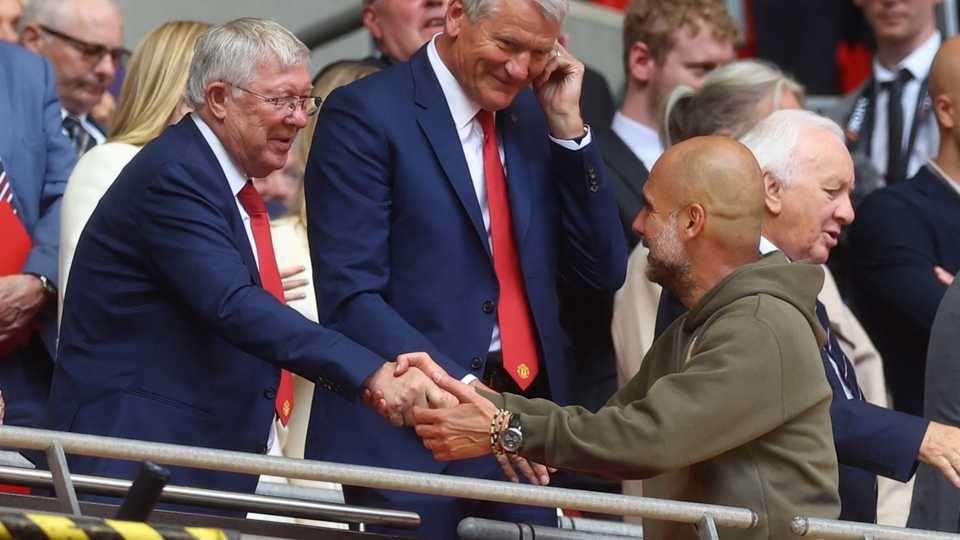Sir Alex Ferguson’s Premier League Manager of the Month Record Leaves Pep Guardiola Stunned: A Deep Dive into Football’s Managerial Legends

The world of football is often dominated by debates over who stands as the greatest player, the most successful club, or the most tactically innovative manager. Among managers, few names resonate as loudly as Sir Alex Ferguson and Pep Guardiola, two figures whose careers have shaped the Premier League and European football in profound ways. Ferguson’s long-standing record of Premier League Manager of the Month awards recently became the subject of amazement and disbelief from Pep Guardiola, highlighting just how dominant the Scottish manager was during his tenure at Manchester United
The Premier League, since its inception in 1992, has grown into arguably the most competitive football league in the world. With clubs boasting immense financial power, a global fanbase, and the pressure of relentless media scrutiny, the role of a manager in England’s top flight has never been more challenging. Success is measured not only in league titles but also in consistency, tactical acumen, and recognition through awards such as the Premier League Manager of the Month accolade.
The Manager of the Month award is more than just a decorative trophy. It reflects the performance of a club under a manager’s leadership during that particular month, recognizing tactical ingenuity, team management, and consistent results against challenging opposition. Historically, it has been a marker of both short-term success and an indicator of a manager’s long-term capabilities
Pep Guardiola, the Catalan tactician, is widely considered one of the finest managers of the modern era. Since arriving at Manchester City in 2016, Guardiola has revolutionized English football with his possession-based approach, high pressing system, and meticulous attention to detail. His trophy cabinet speaks volumes: six Premier League titles, multiple domestic cup victories, and the historic treble-winning season of 2023 place him among football’s managerial elite.
Yet, even a figure as decorated as Guardiola has found himself humbled by the accomplishments of his predecessors. In an interview, Guardiola expressed genuine astonishment upon discovering the sheer volume of Premier League Manager of the Month awards collected by Sir Alex Ferguson, revealing a rare moment of candid admiration for a fellow manager
Sir Alex Ferguson’s managerial career, particularly his 26-year spell at Manchester United, is unparalleled in Premier League history. Ferguson’s record is a testament to not only winning titles but also maintaining dominance over decades of evolving football landscapes. His 13 Premier League titles, combined with two Champions League trophies, make him an icon whose influence transcends statistics alone.
One area where Ferguson’s dominance becomes particularly evident is in the Premier League Manager of the Month awards. Over his career, he won a staggering 27 of these monthly accolades—a figure that still leaves many, including Guardiola, in awe. The consistency required to achieve such recognition month after month over two decades illustrates Ferguson’s ability to adapt, innovate, and motivate, regardless of the squad at his disposal
Despite Guardiola’s own impressive record, which includes 11 Premier League Manager of the Month awards, the Catalan coach admitted that Ferguson’s tally left him “gobsmacked.” It is worth noting that Guardiola, despite winning a historic treble with Manchester City, has not been recognized with this monthly award since December 2021. This includes his landmark 2023 season where City clinched the Premier League, FA Cup, and Champions League.
The situation highlights an intriguing dynamic in football awards: short-term recognition does not always align perfectly with overall achievements. Managers like Guardiola may achieve long-term historic success without frequently being celebrated for individual months. Meanwhile, managers like Ferguson, who consistently deliver results across decades, accumulate recognition more steadily.
During a light-hearted interview in January 2022, Guardiola expressed playful ambition about matching Ferguson and Arsène Wenger in Manager of the Month awards. However, when informed that Ferguson’s total stood at 27—more than double Guardiola’s own tally—the City manager laughed in disbelief, conceding, “Okay… it belongs to him! I will not chase him for sure.” The moment reflected both humility and respect, emphasizing the extraordinary legacy Ferguson built over his career.
To fully appreciate the scope of Ferguson’s achievement, it is helpful to examine some statistics. Pep Guardiola, as of July 2025, boasts the highest points-per-match record in Premier League history at 2.30, accumulated over 342 matches across nine seasons. Ferguson, while slightly lower in points per match at 2.16, achieved this across an astounding 810 matches spanning 21 seasons. The sheer volume of games managed by Ferguson underscores his consistency and resilience—qualities essential for sustained success in one of the most demanding leagues in the world.
Other managers who rank highly in Premier League history include Jurgen Klopp, Roberto Mancini, Jose Mourinho, Antonio Conte, Mikel Arteta, Arsène Wenger, Thomas Tuchel, and Carlo Ancelotti. While some, like Wenger and Mourinho, combine longevity with substantial achievements, others, such as Klopp and Conte, have shorter yet highly impactful tenures. Ferguson and Guardiola, however, remain unique in that they combine consistent domestic dominance, tactical innovation, and international success across multiple seasons.
| Position | Name | Matches | Seasons | Points | Points Per Match |
| ——– | —————– | ——- | ——- | —— | —————- |
| 1st | Pep Guardiola | 342 | 9 | 787 | 2.30 |
| 2nd | Sir Alex Ferguson | 810 | 21 | 1,752 | 2.16 |
| 3rd | Jurgen Klopp | 334 | 9 | 705 | 2.11 |
| 4th | Roberto Mancini | 133 | 4 | 273 | 2.05 |
| 5th | Jose Mourinho | 362 | 12 | 735 | 2.03 |
| 6th | Antonio Conte | 132 | 4 | 268 | 2.03 |
| 7th | Mikel Arteta | 209 | 6 | 410 | 1.96 |
| 8th | Arsène Wenger | 828 | 22 | 1,627 | 1.96 |
| 9th | Thomas Tuchel | 63 | 3 | 122 | 1.94 |
| 10th | Carlo Ancelotti | 134 | 4 | 246 | 1.84 |
These statistics reveal the multi-faceted nature of managerial excellence. While points per match favor efficiency and peak performance, long-term impact considers durability, adaptability, and influence over multiple generations of players—a criterion where Ferguson reigns supreme.
A closer look at Ferguson and Guardiola’s styles reveals why their approaches have led to such sustained success. Ferguson was renowned for his psychological mastery, ability to motivate diverse squads, and tactical flexibility. He could rebuild a team multiple times without compromising Manchester United’s competitiveness. His ‘hairdryer’ approach, combined with strategic planning, ensured that United remained a dominant force in both domestic and European football.
Guardiola, in contrast, emphasizes possession, positional play, and intense pressing. His meticulous preparation and emphasis on technical perfection have revolutionized Manchester City’s approach to football. While Ferguson excelled in man-management and adaptability, Guardiola’s influence is seen in the very DNA of his team’s playing style, with City often dictating matches through fluid passing and strategic intelligence.
While Ferguson’s record is unparalleled, other managers have also made their mark on the Premier League Manager of the Month awards. Arsène Wenger, for instance, won the accolade 15 times during his 22-year Arsenal tenure, highlighting both success and longevity. Managers like Mikel Arteta and Erik ten Hag have collected multiple awards in a shorter time frame, reflecting early achievements and promising careers. Meanwhile, temporary managers like Mike Jackson, who briefly led Burnley, have also been recognized, illustrating that impactful leadership can be acknowledged regardless of tenure length.
The reaction of Guardiola upon learning Ferguson’s record underscores a rare, candid moment in football: one legendary manager expressing genuine admiration for another. It’s a reminder that even the most successful figures in the sport recognize the achievements of their predecessors. Guardiola’s respect for Ferguson reflects the deep appreciation for history and legacy that defines elite football leadership.
This dynamic also serves as inspiration for current and future managers. Achieving short-term success is important, but building a career marked by consistency, adaptability, and resilience is what elevates a manager to legendary status. Ferguson’s career remains a blueprint for aspiring managers, while Guardiola’s evolving legacy demonstrates that innovation and tactical mastery can achieve historic milestones in a modern contex
Sir Alex Ferguson’s extraordinary record of 27 Premier League Manager of the Month awards is more than just a statistic—it’s a symbol of sustained excellence, adaptability, and influence over decades of English football. Pep Guardiola’s astonishment upon learning of this achievement reflects the magnitude of Ferguson’s legacy and the challenges faced by modern managers trying to emulate such enduring success.
While Guardiola continues to add to his own remarkable record and has already set the benchmark for efficiency with the highest points-per-match average, Ferguson’s accomplishments remind football fans and professionals alike that longevity, resilience, and consistent excellence are the hallmarks of true greatness. The Premier League, with its high stakes and constant scrutiny, will forever honor Ferguson as the standard against which all managers are measured—and Guardiola’s admiration is a testament to that enduring legacy.
Even as Guardiola faces the challenges of his current managerial spell and seeks to extend his influence in English football, Ferguson’s record remains a high watermark, one that continues to inspire managers, players, and fans around the world.















